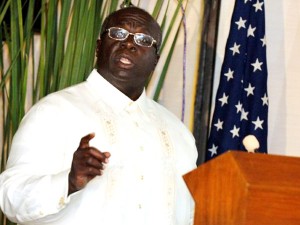The United States provided more than $507 million (about P21.7 billion) in military assistance to the Philippines from 2001 to 2010, US Ambassador Harry Thomas Jr. has disclosed.
In addition, he said, Washington had invested more than P200 million in the just-concluded Philippines-US Amphibious Landing Exercise, or Phiblex, and in “improvements at various Armed Forces of the Philippines bases.”
Speaking at the Phiblex closing rites last weekend at Fort Bonifacio, Thomas said, “At Basa Air Base (in Pampanga) alone, over P42 million has been earmarked to build barracks, latrines and a dining facility for both Philippine and US troops, while at Fort Magsaysay (in Nueva Ecija), over P25 million is being spent on road improvements.”
The envoy noted that the US government “has worked with the Armed Forces of the Philippines for nearly a decade to blunt the ability of terrorists to spread violence and fear in the southern Philippines.”
“We have provided radars as part of the Coast Watch System. And we’ve recently transferred a Hamilton-class US Coast Guard cutter that has now become a proud flagship of the Philippine Navy,” Thomas said.
Thomas lauded the joint military exercise.
“Just like past bilateral (military) exercises and activities (between the two countries), all those involved in this year’s Phiblex have enjoyed a sense of camaraderie, teamwork, hard work and good fun. We look forward to doing it all again next year,” he said.
“For the past 12 days,” he added, “our two nations’ soldiers, sailors, airmen and Marines worked together as a team with a single purpose. The lessons learned during the long hours of exercise are important, but so are the lessons learned during those few moments of rest, when our respective service members had the chance to share a joke, learn some new words, maybe try a little halo-halo and make a friend for life.”
The 10-day Phiblex, he said, “has a very simple purpose: Helping the US and the Philippines work together to build that safe and secure environment free and democratic nations need to live, work and prosper.”
He added, “Our commitment to this shared objective is embodied in our Mutual Defense Treaty (MDT), a pillar of our relationship. The MDT enables us to work together. It facilitates our cooperation and training, and it allows us to serve our citizens more efficiently and more professionally.”
Like the MDT, he said, Phiblex also “reflects the longstanding, close relationship between the Philippines and the US. Our countries share not only a common history, but we also share a mutual commitment to global peace, security and prosperity. Phiblex is our chance to practice the skills that allow us to be better partners in disaster relief, in peacekeeping operations and in counterterrorism efforts.”


